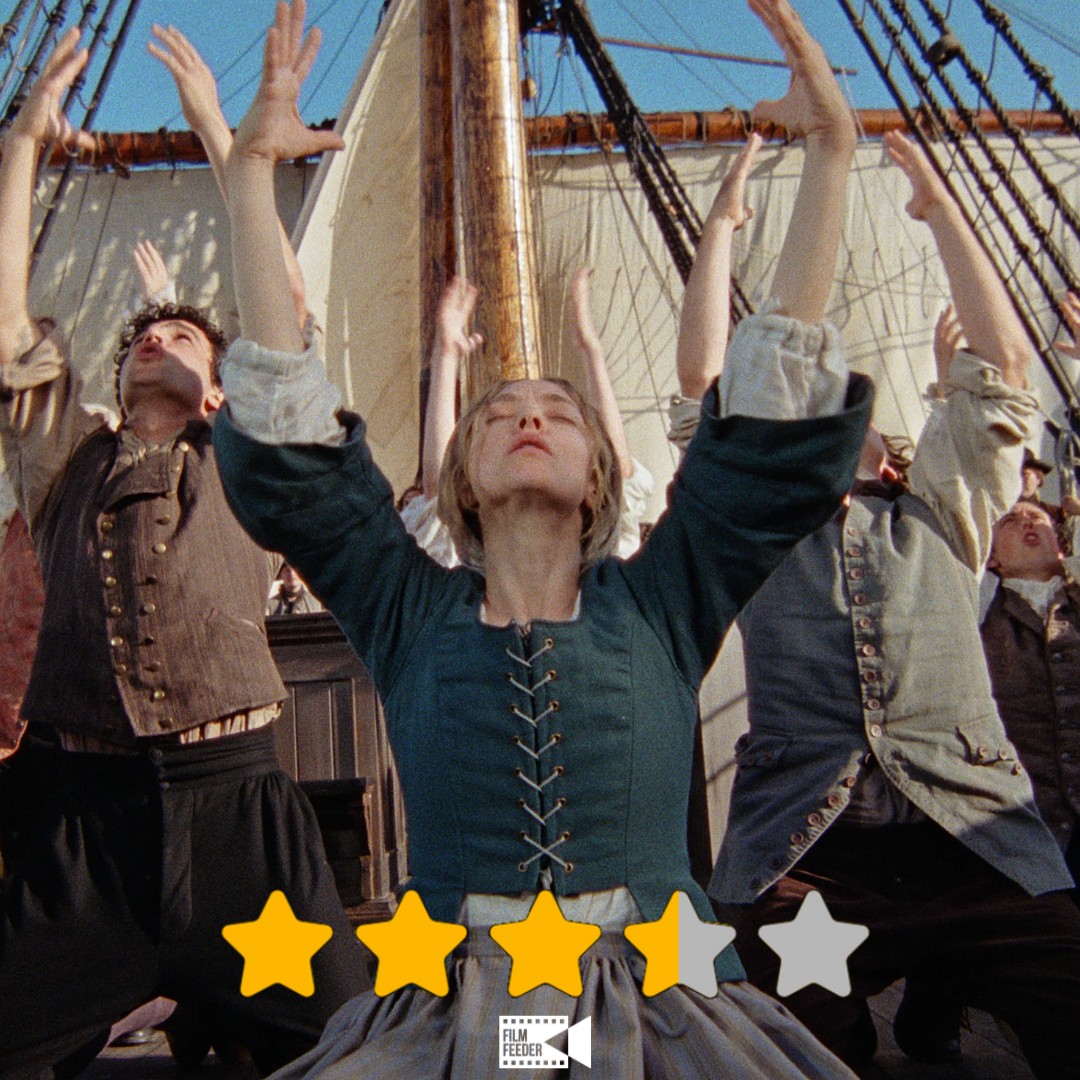
The Glassworker (dir. Usman Riaz)
Certificate: 12A
Running Time: 98 mins
UK Distributor: Dazzler Media
UK Release Date: 19 September 2025
WHO’S IN THE GLASSWORKER?
[ENGLISH VERSION] Sacha Dhawan, Anjli Mohindra, Art Malik, Tony Jayawardena, Teresa Gallagher, Mina Anwar, Sham Ali, Maya Saroya, Nila Aalia, Alex Jordan, Bex Wood
[URDU VERSION] Mooroo, Mariam Riaz Paracha, Khaled Anam, Ameed Riaz, Mahum Moazzam, Faiza Kazi, Dino Ali, Aysha Sheikh, Usman Riaz, Khalifa Sajeeruddin
WHO’S BEHIND THE CAMERA?
Usman Riaz (director, composer, cinematographer), Moya O’Shea (writer), Manuel Cristóbal and Khizer Riaz (producers), Carmine Di Florio (composer), José Manuel Jiménez (editor)
WHAT’S IT ABOUT?
The son of a glassworker (Dhawan/Mooroo) develops a wartime romance…
WHAT ARE MY THOUGHTS ON THE GLASSWORKER?
In creating the first-ever fully hand-drawn animated film to emerge from Pakistan, filmmaker Usman Riaz has become a pioneer of animation like Walt Disney, John Lasseter and Hayao Miyazaki before him. It is the latter animator, though, that Riaz takes the most obvious inspiration from, not just in style but in the gentle and somewhat lyrical manner of storytelling he brings to The Glassworker, a film that you could almost mistake for an actual Studio Ghibli film if one were to look at it from a distance.
But let’s not get ahead of ourselves. While this is a perfectly pleasant film in and of itself, one that boasts some truly gorgeous animation, The Glassworker shatters in comparison to the work of Miyazaki’s studio, especially in the narrative department. Nonetheless, as a formidable tribute to that particular style of animated storytelling, it holds together well enough.
The film takes place in a small seaside town where our protagonist, Vincent Oliver (voiced by Sacha Dhawan in the English dub, and by Mooroo in the original Urdu version), is the son and apprentice of the town’s glassworker Tomas Oliver (Art Malik/Khaled Anam). As war with an undefined opposing nation looms, the arrival of Colonel Amano (Tony Jayawardena/Ameed Riaz) and his army infuriates Tomas, whose pacifism alienates him and Vincent from most of the town. Vincent, however, becomes infatuated with the Colonel’s daughter Alliz (Anjli Mohindra/Mariam Riaz Paracha), and they develop a strong bond that carries them through childhood to the cusp of adulthood, when the ongoing war threatens to tear them apart.
One can link many things between The Glassworker and your average Studio Ghibli offering. The animation style is the most obvious, as Riaz employs a heavy anime-influenced look to the characters and backdrops which often makes it look and feel like it could take place in the same universe as Howl’s Moving Castle, especially with certain steampunk designs that seem lifted directly from that very movie. But even without that explicit connection, this is still some extremely well-crafted animation, as there is colour and life in every frame that Riaz and his team of animators have put together, and while sometimes it isn’t as smooth as some of the more prominent anime or anime-inspired films out there – the characters’ movements can seem a bit jagged, and in certain conflict-heavy scenes there are times when the frame shakes so much you can barely tell what you’re even looking at – there is still plenty of hand-drawn beauty to behold here.
Narratively, the film has its fair share of strengths and weaknesses. The story itself focuses primarily on the budding romance between Vincent and Alliz, which gives it a nice classical tone and provides a comfortable focus, but the characters simply aren’t interesting or compelling enough to make you fully root for their union, as you never entirely feel or even understand their connection to one another. There are a couple of times in the movie when Vincent does and says things to Alliz out of pure pettiness that would honestly make anyone not want to talk to him again, yet the film wants its audience to cheer for him to end up with her for no other reason other than he’s the protagonist, which makes it hard to completely be on his side, even at his lowest moments. Outside of that, they’re both merely stock star-crossed lovers, who go through the motions of a love story in a world that’s dead-set on keeping them apart, and individually there’s not much else to them other than rather bland personalities.
The more intriguing aspects of The Glassworker lie within some of its less prominent themes and ideas. For instance, there is a recurring motif of mystical Djinns popping up every so often to guide the main characters on their journey, and at one point even briefly turn the film into a borderline body-possession horror. On a more grounded scale, other characters like Tomas are forced to reckon with their ultimate role in the war despite their pacifist beliefs, and the film takes a precious few moments to address the guilt and regret within them that makes them far more three-dimensional than either of the two actual leads. Whenever the film focuses on those things, it genuinely feels like the kind of sophisticated and magical-realist storytelling that one would expect from Pixar or, indeed, Studio Ghibli, as Moya O’Shea’s script gives them plenty of attention to resonate emotionally with the viewer, in addition to providing some strong moral conflict that creates some powerful human drama.
While it’s far from a perfect film as a whole, The Glassworker nonetheless retains its importance as a groundbreaking bit of animation from a part of the world where such a medium is, until now, barely existent. You can feel the passion in Riaz and his fellow animators as they put together frame after frame of stellar hand-drawn visuals that service a decent, if slightly bare, narrative, and their love for the craft is clearly what drives them to complete a film that will hopefully open up plenty more opportunities for future animation pioneers in the years to come. For now, it would be foolish to count Pakistan out of the animation field just yet.
SO, TO SUM UP…
The Glassworker is a gorgeously animated romantic drama that boasts some striking hand-drawn visuals within a narrative that on the one hand offers intriguing themes of both grounded and magical-realist quality, but on the other hands also has some blander and less cosy elements that keep it below the works of its peers.














0 Comments